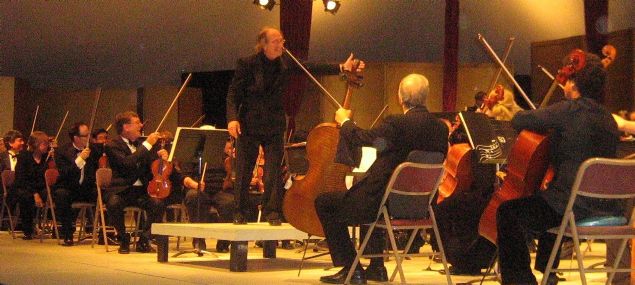|
Symphony
FROM THE NEW WORLD TO THE OLD WORLD
by Peter Lert
Saturday, June 14, 2025
Chamber
MC2 DUO RECITAL CLOSES 222'S SEASON
by Terry McNeill
Saturday, June 14, 2025
Choral and Vocal
CANTIAMO SONOMA'S LUSCIOUS A CAPELLA SINGING IN SEASON ENDING CONCERT
by Pamela Hicks Gailey
Sunday, June 8, 2025
Symphony
SRS SEASON ENDS WITH RESOUNDING TA-TA-TA-BANG
by Terry McNeill
Sunday, June 1, 2025
Symphony
YOUTHFUL VIRTUOSITY ON DISPLAY AT USO'S MAY CONCERTS
by Peter Lert
Saturday, May 17, 2025
Symphony
MYSTICAL PLANETS AND LIVELY GERSHWIN ORTIZ AT FINAL SRS CONCERT
by Peter Lert
Sunday, May 4, 2025
Symphony
VSO'S CONCERT MUSIC OF TIME, MUSIC OF PLACE
by Peter Lert
Sunday, April 27, 2025
VOCAL ELEGANCE AND FIRE AT THE 222'S RECITAL APRIL 26
by Pamela Hicks Gailey
Saturday, April 26, 2025
CANTIAMO SONOMA SINGS AN INSPIRED GOOD FRIDAY MOZART REQUIEM CONCERT
by Pamela Hicks Gailey
Friday, April 18, 2025
DRAMATIC SHOSTAKOVICH SYMPHONY CLOSES PHILHARMONIC'S 25TH SEASON
by Terry McNeill
Sunday, April 13, 2025
|
 |
 Conductor Allan Pollack gestures to the Festival Orchestra after the Tchaikovsky Fifth Symphony |
ALL RUSSIAN PROGRAM LAUNCHES 24TH MENDOCINO FESTIVAL SEASON
by Terry McNeill
Saturday, July 10, 2010
In a high-energy program of Russian music, conductor Allan Pollack and his Festival Orchestra opened the 24th Mendocino Music Festival season in grand style July 11 in the massive white tent on the Mendocino headlands bluff.
Even before the downbeat for the Shostakovich “Festival Overture,” Op. 96, the excitement in the tent was palpable. On mounting the podium, Mr. Pollack received a standing ovation mixed with yells and whistles. Clearly the audience honors his decades of musical work on the North Coast, and the Overture launched the entire Festival with sonic splendor. The opening flourish in the horns pressaged a big night for brass and Mr. Pollack drove the tempos throughout, leading to a romp in the coda. It was a weighty reading, lacking the usual Shostakovich acerbic texture but altogether effective.
Tchaikovsky’s Fifth Symphony in E Minor, Op. 64, was the evening’s highlight. Though cold fog swirled around outside of the tent, the “fate” motive of the first movement was warmly stated, first in the low strings and bass clarinet, and in the march theme. This is familiar territory for Tchaikovsky, the “motto” theme always in the low register The first block of four repeated chords (four times) was deftly handled by Mr. Pollack with a chaste ritard, giving just the right heft to the phrase. The clarinet solos from principal Art Austin were uniformly elegant, though the pungent horns tended to cover the strings, an all-evening deficit. Tchaikovsky’s counterpoint was here underlined by a lovely interplay of cellos, violas and again horns.
The famous horn solo that begins the second movement (after a long and muted introduction) was played tenderly and almost “sui generis” by William Klingelhoffer, followed by principal oboist Thomas Nugent’s emotional solo in the second theme. The third-movement Waltz was handled by the Orchestra with style, spotlighting Carolyn Lockhart’s bassoon artistry.
The finale was feast for trumpets and trombones, Tchaikovsky’s orchestration a vivid example of what he learned from his teacher Anton Rubinstein and how effectively he surpassed that master. Mr. Pollack kept everything in hand, the “fate” theme returning and the coda in every way triumphant. There was distinct voice leading and the secondary idea of a martial character, exemplified by a pulsating ostinato bass, rang throughout the hall. The ending, with rich brass phrases, was splendid. This movement seems overly long compared with the rollicking finale of the Fourth Symphony, the ideas piling up and sometimes difficult to follow.
The ovation for the conductor, his orchestra and Tchaikovsky’s genius was loud and long.
Ending the first half was a stalwart but somewhat unsatisfying account of Prokofiev’s Third Piano Concerto, Op. 26, with San Francisco-based Stephen Prutsman as the soloist. Mr. Prutsman’s playing of the popular work, seemingly a stable in every piano competition, was effective and provided fast scales in abundance. The problem in the performance was one of balance as the orchestral sound frequently covered the soloist. One could see Mr. Prutsman but could not easily hear him.
The machine-gun like rhythms of the finale were never a challenge for Mr. Prutsman, but the filigree on the edges of the composer’s demanding themes tended to be lost in the tent’s acoustics. The string entries were often ragged and there were sporadic bobbles in the horns, something of little import in this powerful concerto. No real pianistic “color” is needed for this work with its driving style and histrionics, and the soloist and conductor were of one mind.
A strange occurrence happened at the last fortissimo chord of the Prokofiev when the house lights were suddenly extinguished. Was it the impact of Mr. Prutsman’s pianism in the pungent treble of the piano? A too-energetic final downbeat from the conductor? A slip by a backstage technician? We may never know.
|

